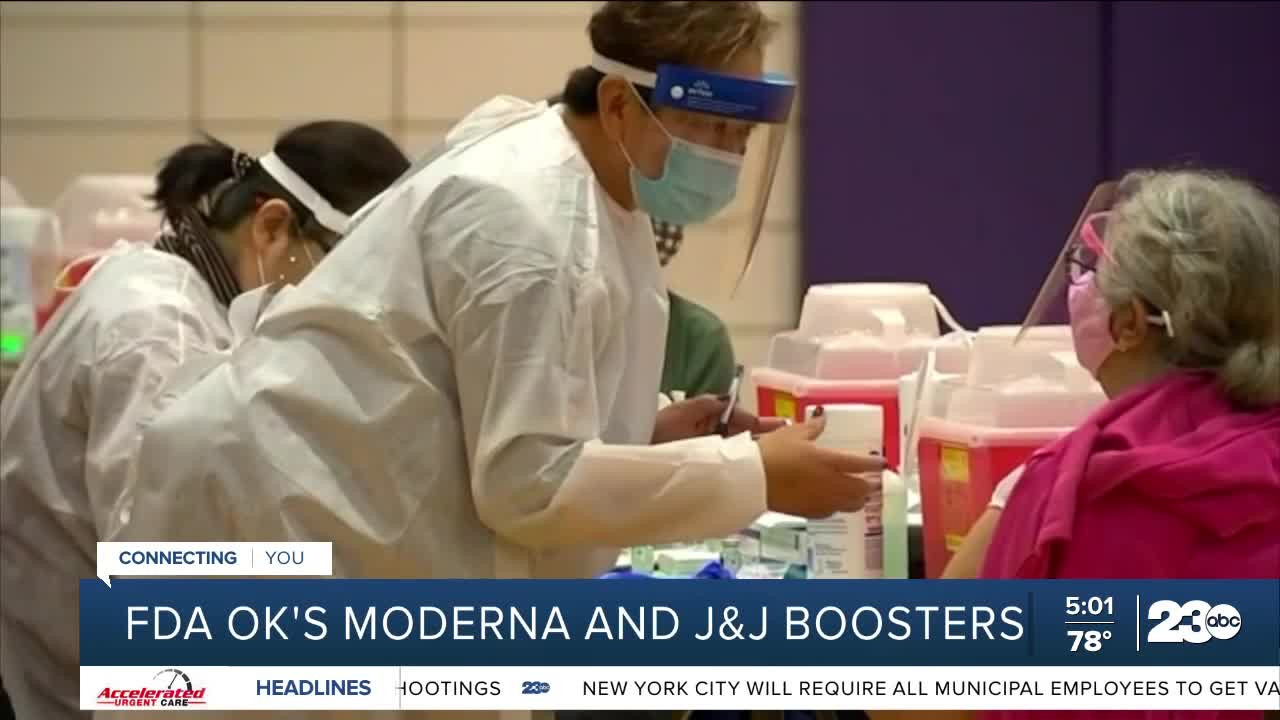BAKERSFIELD, Calif. (KERO) — More booster shot options may soon be available. On Wednesday the Food and Drug Administration (FDA) has approved a single-dose booster for the Moderna and Johnson & Johnson COVID vaccines. Pfizer received approval earlier this year.
A doctor with Omni Family Health told 23ABC the reason people even need boosters at all is that the efficacy of vaccines wanes over time. He says that with stronger variants like the Delta variant, it is even more important to continue to boost your immune system to fight off the mutating virus.

National News
FDA OKs mixing COVID vaccines; backs Moderna, J&J boosters
"Since the approval for the Pfizer vaccine booster has come out, we have had a lot of patients coming to the clinic and also to our community events where we give vaccination requesting vaccination. So, we see the increase in boosters in our patients, and a lot of patients are actually disappointed if they are not in the eligible group," said Dr. Parthiban Munnainathan.
For now, those eligible for the single-dose boosters are as follows (Moderna and Pfizer follow the same guidance):
- 65 years of age and older
- 18 through 64 years of age at high risk of severe covid-19
- 18 through 64 years of age with frequent institutional or occupational exposure to SARS-CoV-2
- Eligible 6 months after the initial two doses
The Johnson & Johnson booster on the other hand is approved for those 18 and older, 2 months after the initial dose.
But the eagerness Dr. Munnainathan spoke about is not met by all Kern County residents. In fact, the county still lags behind statewide numbers for vaccination. The Centers for Disease Control and Prevention (CDC) dashboard shows 43 percent of eligible residents are fully vaccinated.
For those who are interested in getting a booster, Wednesday's announcement also gave the green light to mix and match the booster dose.
Dr. Hemmal Kothary with Dignity Health Bakersfield said it might even be more beneficial to mix.
"If you take the Johnson & Johnson and you add an mRNA, the ability to fight off virus is 4x higher than if you took another separate Johnson & Johnson."
Kothary said this is because the Johnson & Johnson vaccine has a different way of fighting COVID that does not use the mRNA technology found in the Moderna and Pfizer vaccines. So, if you combine the two, you can cover all your bases with the different approaches of each vaccine type.
What is a mRNA COVID-19 Vaccine?
Messenger RNA vaccines — also called mRNA vaccines — are some of the first COVID-19 vaccines authorized for use in the United States.
mRNA vaccines are a new type of vaccine to protect against infectious diseases. To trigger an immune response, many vaccines put a weakened or inactivated germ into our bodies. Not mRNA vaccines. Instead, they teach our cells how to make a protein—or even just a piece of a protein—that triggers an immune response inside our bodies. That immune response, which produces antibodies, is what protects us from getting infected if the real virus enters our bodies.
COVID-19 mRNA vaccines give instructions for our cells to make a harmless piece of what is called the “spike protein.” The spike protein is found on the surface of the virus that causes COVID-19.
- First, COVID-19 mRNA vaccines are given in the upper arm muscle. Once the instructions (mRNA) are inside the muscle cells, the cells use them to make the protein piece. After the protein piece is made, the cell breaks down the instructions and gets rid of them.
- Next, the cell displays the protein piece on its surface. Our immune systems recognize that the protein doesn’t belong there and begin building an immune response and making antibodies, like what happens in natural infection against COVID-19.
- At the end of the process, our bodies have learned how to protect against future infection. The benefit of mRNA vaccines, like all vaccines, is those vaccinated gain this protection without ever having to risk the serious consequences of getting sick with COVID-19.
- Centers for Disease Control and Prevention (CDC)
Although only one single dose booster was FDA approved, Dr. Kothary said he does expect booster to become common.
"Boosters are going to be something we do for the rest of our lives, so we are going to get boosters now and then probably. I think as we learn more I think it is going to be not every 6 months, but I think every 8 to 10 months as we find out how our immune system holds up against the virus and how the boosters are holding our antibodies up."
Although the FDA is a major step in making boosters available, the CDC first needs to give their approval before you can go out and get your booster shot. That conversation is set to happen as early as Thursday.



